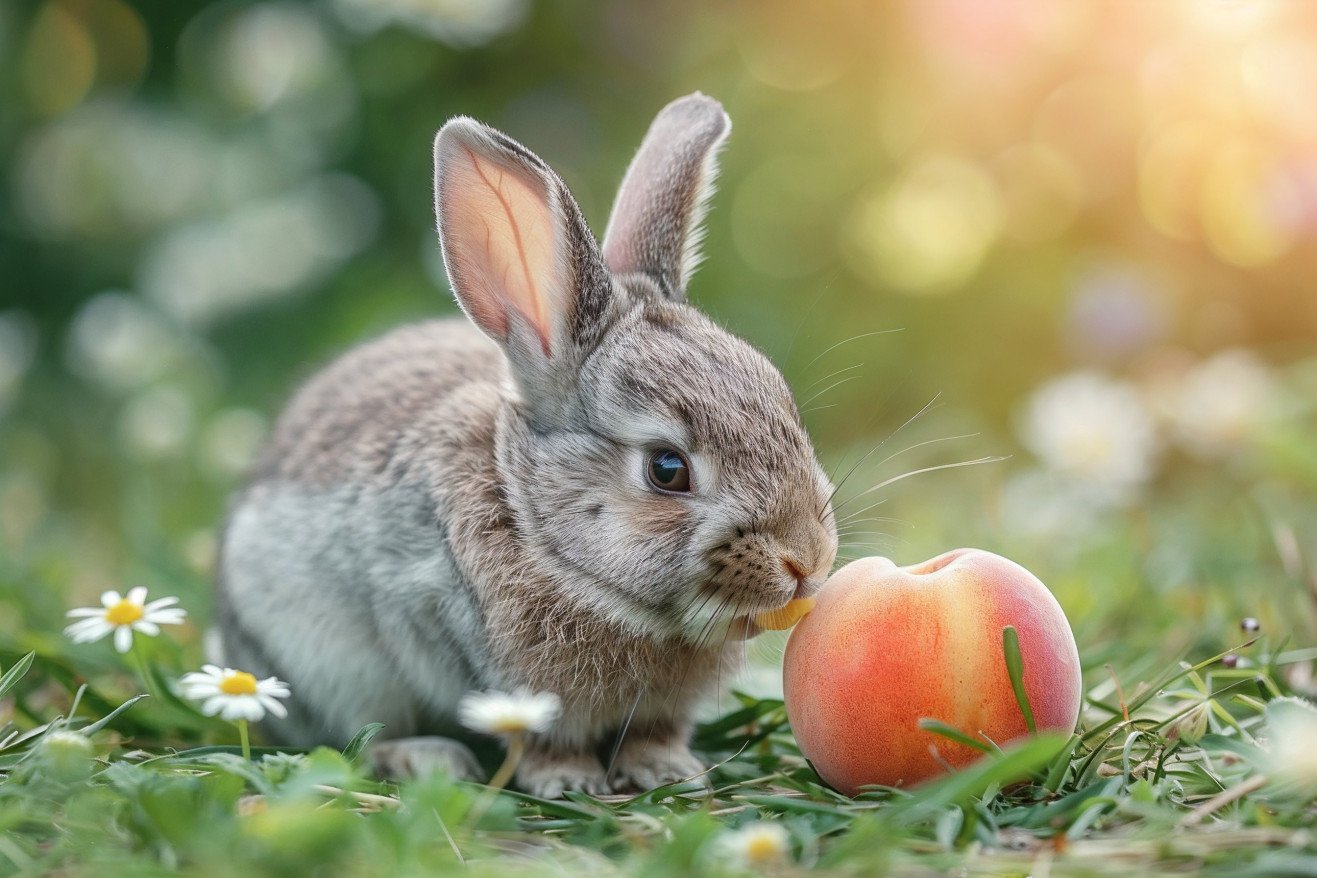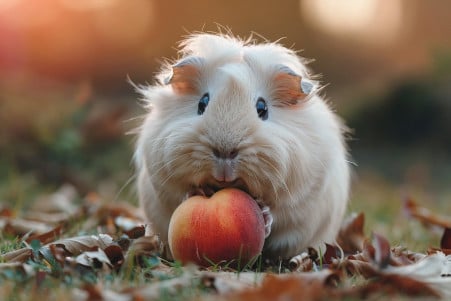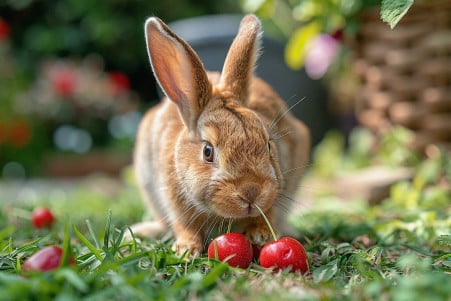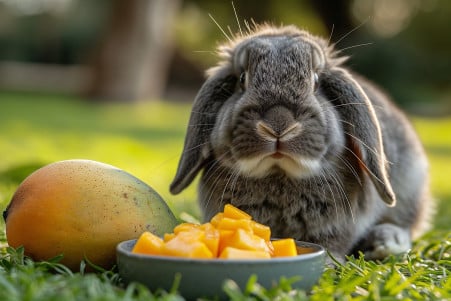Can Rabbits Eat Peaches? A Guide to Safe Snacking
10 March 2024 • Updated 9 March 2024

The sweet, juicy taste of peaches makes you wonder: can rabbits have peaches? Yes, rabbits can eat peaches, but only as an occasional treat. Because peaches are high in sugar, it’s important to make sure you only give your rabbit small pieces of peach flesh without the pit to avoid digestive upset.
You should also make sure to limit the number of peaches you give your rabbit to make sure you aren’t throwing off their diet.
This article will explore a wide range of studies from veterinary science, animal nutrition, and pet care to give you a comprehensive understanding of the topic. We’ll discuss the ins and outs of rabbit nutrition, the nutritional content of peaches, and how to safely incorporate treats into your rabbit’s diet.
By the end of this article, you’ll have the information you need from a number of sources to make sure your furry friend can enjoy peaches without any issues.
Can rabbits eat peaches?
What Rabbits Eat in the Wild
According to Outforia, wild rabbits eat a wide range of plant-based foods, but their main diet consists of grasses, clover, and other green plants, which is why today’s pet rabbits are herbivores.
This grazing diet has carried over from their wild ancestors to modern domesticated rabbits, and their digestive systems have evolved to accommodate it. For example, their long hindgut is designed for hindgut fermentation, which helps them get the most nutrition out of the cellulose in the plants they eat, according to Outforia.
In addition, their cecum is a specialized organ that acts as a fermentation vat, which helps them get important nutrients and B vitamins from their food.
Wild rabbits eat some fruit, but it’s not a main part of their diet. Instead, it’s a supplement, and the same should be true for domestic rabbits like those that eat peaches. This is why peaches and other fruits should be fed to domestic rabbits in moderation.
When you consider the wild diet of rabbits and their digestive systems, it’s easy to see why rabbits can eat peaches and other sweet fruits, but it’s also easy to see why these treats should be limited to ensure rabbits’ nutritional needs as herbivores are met.
Nutritional Value of Peaches
Peaches contain a variety of vitamins and minerals that are important for overall health. According to Medical News Today, one cup of diced peaches contains important nutrients like vitamin C, which makes up 14.80% of the daily value for adults, and dietary fiber, which has been shown to help with digestion and heart health. That said, this fruit is also high in sugar, 14.10 grams per cupand rabbits are especially sensitive to sugar.
According to Healthline, peaches are a good source of vitamin C and also contain other vitamins like A, E, and K, and minerals like potassium, niacin, and manganese.
Some of these vitamins and minerals are in line with a rabbit’s dietary needs; however, Medivet explains that the high sugar content in peaches is not a good fit for the high-fiber diet that rabbits need.
While peaches can provide antioxidants and even help with skin health, it’s important to weigh these benefits against the potential risks of weight gain and dental issues in rabbits that can come from eating too much sugar. This means that it’s important to use caution and feed peaches in moderation to rabbits to ensure that they get the most health benefits.
Safe Ways to Feed Rabbits Peaches
Because peaches are high in sugar, it’s important to be careful when introducing them to your rabbit’s diet. The most important thing to remember is to keep portions small; a few bites once a week is a good amount for a treat.
As a result, it’s important to feed peaches in moderation to avoid digestive issues as a result of the sugar content. If your rabbit isn’t used to sweet fruits, start with a quarter teaspoon, says. Then, watch their reaction before increasing the amount.
It’s also important to make sure that you remove the pits from the peaches before feeding them to your rabbit. This is because peach pits contain cyanide, which is poisonous to rabbits.
This is noted as it’s important to make sure that you remove these potential hazards to avoid making your rabbit sick or worse. In addition, while the skin of the peach is generally safe, you may want to peel it for rabbits that eat quickly to avoid choking.
Keep an eye on your rabbits after they eat peaches to make sure they don’t show any signs of distress. If they do, stop feeding them peaches and call your vet. Following these tips will help ensure that the occasional peach treat is a safe and fun experience for your pet, adding some variety to their diet without causing digestive issues.
How Rabbits Digest Peaches
Rabbits have a highly specialized digestive system that is designed to process fibrous plant material, not the high sugar content of fruits like peaches, which can disrupt the balance of their sensitive gut microbiome.
As hind-gut fermenters, rabbits rely on their large cecum, which is full of bacteria, to ferment fiber and produce cecotropes that they eat to extract the nutrients they need—a process that Supreme Petfoods notes is essential to their diet.
Meanwhile, the rabbit’s small intestine is responsible for digesting and absorbing most of the nutrients, while the cecum is responsible for fermenting indigestible fiber, according to the journal Companion Animals.
When it comes to peaches, or any other new food, it’s best to introduce them slowly to avoid disturbing the microbial balance in the cecum. The high sugar content of peaches means that they can be especially difficult for rabbits to digest without experiencing negative side effects like gastrointestinal upset or weight gain.
VCA Animal Hospitals recommends that treats be limited to one to two tablespoons once or twice a week to make sure that they are a healthy addition to the rabbit’s diet.
It’s also important to closely monitor the rabbit when introducing new treats like this to make sure that they are able to tolerate it. Pay attention to the rabbit’s feces and overall behavior to see if they are experiencing any negative side effects.
When we think about how the rabbit’s digestive system works, it’s easy to see that while peaches can be a tasty treat, they should be fed with caution to ensure that they support the rabbit’s gut health and overall health.
Finding the Right Balance: How Much Is Too Much?
Of course, a well-balanced diet is important for a rabbit’s health. While treats can help with mental stimulation and variety, Kavee says that they should be given in moderation to avoid confusion.
Supreme Petfoods also suggests a low-sugar diet, noting that it’s important to avoid obesity and the health issues that can come with it, which can be caused by overfeeding. A rabbit’s diet should be made up of good-quality hay, supplemented with leafy greens and measured amounts of specialized feed, with treats making up only a small portion of their daily intake.
Too much sugar from treats can lead to weight gain, dental issues, and even metabolic syndrome, as shown by diet-induced rabbit models in studies cited by PMC. To help prevent these problems, owners should limit their rabbits to one to two tablespoons of treats per day, depending on their size and activity level.
By using treats in this way, they can be used as an occasional treat rather than a regular part of the diet, which will help ensure a rabbit’s physical and mental health, and ultimately, their happiness, activity, and longevity.
Final Thoughts: Can Rabbits Eat Peaches?
So, in conclusion, rabbits can eat peaches, but it’s important to do so in moderation. As discussed above, peaches can be a nice, occasional sweet treat for your rabbit, but only if they are fed in small quantities and without the pits. This fits into the larger picture of a rabbit’s diet, which is high in fiber, low in sugar, and based on their natural foraging tendencies.
Throughout this article, we’ve stressed the importance of understanding these dietary needs in order to ensure your rabbit’s overall health. A treat like peaches should be a special occasion that’s carefully balanced with a diet that’s primarily made up of hay and leafy greens that’s been customized to avoid gastrointestinal issues and maintain the right nutritional balance.
Being a good pet parent means taking all aspects of care, including diet, into consideration. By feeding peaches in a responsible way, you can add a little bit of variety to your rabbit’s life while still making sure that you’re keeping them safe and healthy.
Enjoy the fun of giving them treats like this with the confidence that you’re making a positive contribution to their life and well-being that will help them stay happy and healthy for years to come.


